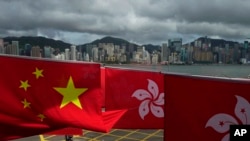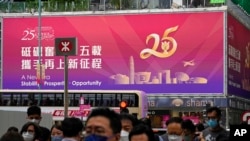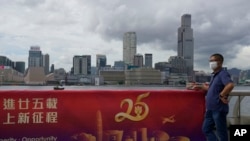Human rights in Hong Kong have deteriorated rapidly since Beijing’s crackdown after the pro-democracy protests of 2019, according to a new survey.
The Human Rights Measurement Initiative (HRMI) published a survey this week showing the rapid change in human rights in Hong Kong, which now ranks close to Saudi Arabia and Venezuela, both near last-place China.
Chung Kim-wah, honorary director of Hong Kong Public Opinion Research Institute, told VOA in a phone interview that survey data show that civil society in Hong Kong has shrunk, and freedom of speech and assembly has been suppressed since the imposition of the Hong Kong version of China’s National Security Law in 2020.
“Watching events in Hong Kong over the past couple of years has been quite harrowing, and so I doubt that Hong Kong’s scores will come as a surprise to any Hong Kong watchers,” said HRMI spokesperson Anne-Marie Brook.
VOA Cantonese contacted the Chinese Embassy in Washington, D.C., for comment on the HRMI survey but has not received a response.
HRMI conducts national surveys to assess quality of life and safety from the state. The surveys are conducted in more than 30 regions worldwide and use up to 13 criteria outlined in United Nations treaties to measure the state of human rights. Respondents to the secure, online Hong Kong survey included local human rights workers, human rights lawyers and journalists covering human rights issues.
HRMI, which is based in New Zealand and the U.S., did not disclose the number or identities of the respondents, to protect them, according to Thalia Kehoe Rowden of HRMI. Some of the respondents have emigrated from Hong Kong.
The data show that Hong Kong's freedom of assembly and association, freedom of expression and political participation continued to decline for the third consecutive year.
For example, the freedom of assembly and association is evaluated on a 10-point scale. Hong Kong scored 4.5 points in 2019 and 2.5 points in 2021, results the survey describes as “very bad.”
Freedom of expression fell from 4.7 in 2019, to 2.7 in 2021, while suffrage dropped from 4 to 2.4 over the same period.
However the survey also found the right to freedom from arbitrary arrest rose from 2.7 in 2019 to 3.5 in 2021.
And Hong Kong scored 4.6 out of 10 for its performance on the right to freedom from torture. According to HRMI, this falls “within the ‘bad’ category and means that a significant number of people are at risk of torture and ill-treatment.” It is the fourth lowest score among the East Asia and Pacific region countries the organizations tracks.
The scores reflect China’s crackdown on Hong Kong after months of pro-democracy street protests in 2019.
In terms of civil and political rights, China scores below 3.5 in 75% of indicators, which is considered “very poor.” In terms of freedom of assembly and association, freedom of expression and political participation, China's overall score is only 2.1, the lowest among the 30 surveyed regions. This was the first year HRMI surveyed China.
"Hong Kong's scores over the last three years are converging on China's very low scores,” Rowden told VOA Cantonese via email Thursday evening. “Hong Kong's empowerment scores [freedom of assembly and association; freedom of opinion and expression; participation in government] have fallen dramatically, so that they are nearly the same as China's.”
Hong Kong survey respondents noted that Chinese law restricts freedom of assembly and association, and that anyone trying to run for office independently would be intimidated, even violently treated or imprisoned.
Dr. K. Chad Clay, an HRMI co-founder who is also its research methodology and design lead, told VOA Cantonese in an email that since the 2020 implementation of the Hong Kong version of China’s National Security Law, “speaking out is likely to result in arrest and detention, which has likely led many people to self-censor in order to avoid their own arrest in response.”
“Backing this up,” he added, “our data absolutely show a continued precipitous decline in the rights to opinion, expression, assembly, and association."
Clay, director of the Center for the Study of Global Issues and an associate professor at The School of Public and International Affairs at the University of Georgia, said it is important to note that Hong Kong’s “government may not feel the need to resort to as many arbitrary and political arrests now that empowerment rights are increasingly restricted.”
“In the years since the National Security Law was passed, it has been shown that speaking out is likely to result in arrest and detention, which has likely led many people to self-censor in order to avoid their own arrest in response,” he said. “Backing this up, our data absolutely show a continued precipitous decline in the rights to opinion, expression, assembly, and association.”
Chung said last year he saw police using the social gathering ban that is supposed to prevent the spread of COVID-19 to suppress gatherings in Causeway Bay on June 4 for the anniversary of the Tiananmen Square Massacre. This “was very blatant and abusive of the law, and the purpose and spirit of the legislation is contrary to its original purpose.” This year, local authorities warned people to avoid the Victoria Park Tiananmen memorial and police detained several who ignored the caution.
Chung also said some Hong Kong political prisoners have been remanded for two years without being convicted. Because of the pandemic, outsiders are not allowed to visit inmates. One prisoner’s request for pens and paper was rejected.
"The most outrageous thing is that in just a few weeks, he was transferred to different prison cells five, six times without being given any reason,” he added. “This is obviously a kind of strategy that makes people lose their autonomy and lets them be manipulated. I think this is also torture."
Simon Cheng, founder of Hongkongers in Britain group, told VOA in a phone call that the good thing about the quantified indicators is that the changes can be evaluated with the same standards, and “they don’t talk past each other and it won’t turn it [the survey] into a political game.”
“This will prevent China from saying that each (country) has its own standards and making everyone lose direction.”









